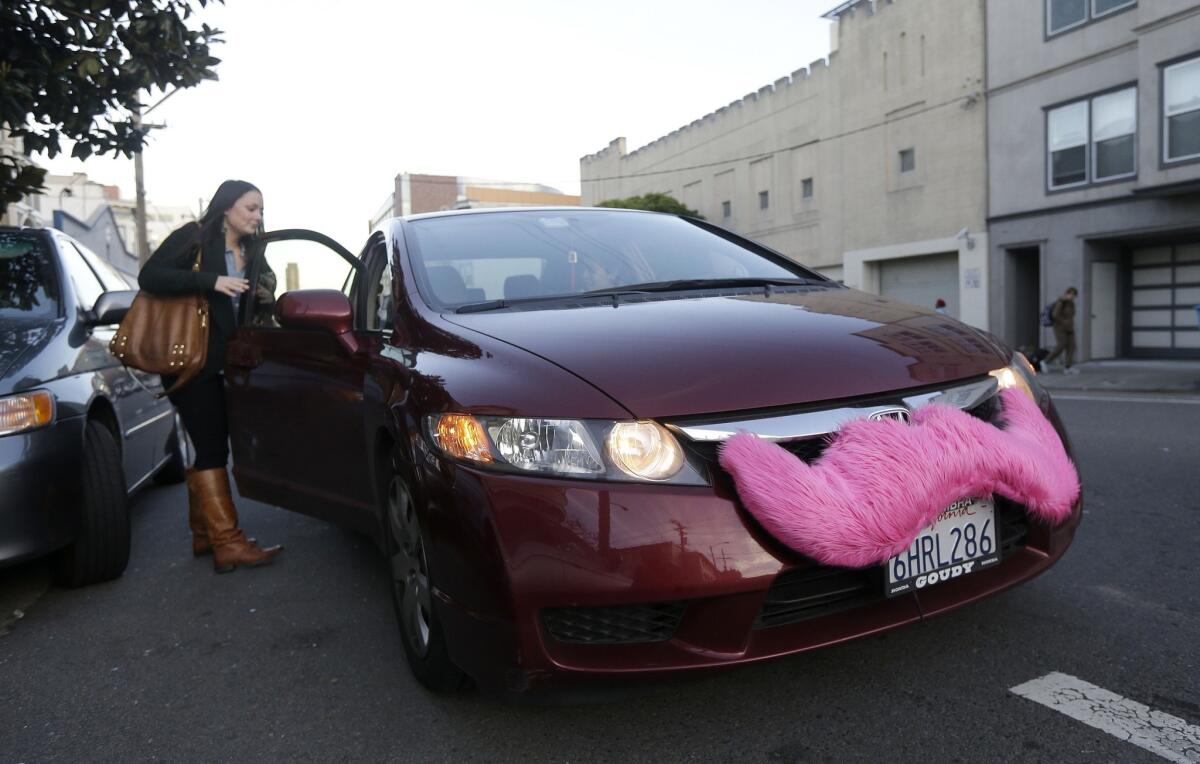Ride-sharing companies accused of misleading customers on safety

- Share via
Reporting from San Francisco — Since its early days as a taxi alternative for Northern California bar-hoppers, the ride-sharing industry, now worth billions of dollars, has prompted demands for stricter government control from public officials and competing cab companies.
More regulatory pushback came this week, when the district attorneys of Los Angeles and San Francisco wrote letters to the three biggest app-based transportation companies, accusing them of misleading consumers about their safety requirements and refusing to follow state laws.
San Francisco Dist. Atty. George Gascón said Friday he hopes Uber, Lyft and Sidecar will correct multiple civil violations of state and local laws. If they don’t, he said, prosecutors could file restraining orders or hit the companies with hefty fines.
The prosecutors’ letters are the latest in a months-long dispute between the start-ups and officials grappling with how to regulate them. The companies allow customers to summon rides using smartphone apps, and drivers transport passengers in their personal vehicles. The services are often marketed as a cheaper, more casual alternative to taxis and have rapidly gained popularity in San Francisco and Los Angeles.
The investigation began in response to “multiple complaints,” Gascón said. The letters allege that the firms have failed to comply with rules that govern airport pickups and fare pricing, and have falsely told consumers that background checks ensure drivers have no criminal record or previous driving violations.
“We are very early in the process, and we are trying to establish a dialogue,” Gascón said. “Behavior that we believe is problematic has to stop.”
Uber and Sidecar representatives said their firms’ background checks comply with state law. Other charges are a result of misunderstandings, they said. Lyft did not return requests seeking comment.
“We have a common interest,” said Sunil Paul, the chief executive and founder of Sidecar, of a meeting with prosecutors scheduled next week. “They have a high priority on safety, and our No. 1 concern is safety for riders, drivers and the public.”
Last fall, the California Public Utilities Commission passed rules that allow the services to legally operate statewide. The action put in place some basic safeguards, including mandatory background checks, driver training and insurance policies.
But it did not exempt ride-sharing firms from additional rules put in place by other agencies, like Los Angeles International Airport, which requires that all commercial drivers pay a flat fee before picking up passengers.
Uber, Lyft and Sidecar have all recently launched carpooling services that allow strangers who are headed the same direction to share a car and split the fare. That option violates a state law banning individual fares for each passenger, regulators say. The ride-sharing firms say the option simply splits one fare between multiple people.
Such chafing is bound to happen as new companies spring up in the so-called sharing economy, said Arun Sundararajan, a New York University economics professor. “We’re still … trying to figure out the right division of responsibilities between the government and the platforms,” he said. “Any new system has wrinkles that you have to iron out over time.”
Earlier this year, the PUC threatened to revoke the operating licenses of five ride-sharing companies if they did not pay for proper permits at five California airports.
Competing taxi firms and a recent statewide audit have all criticized the commission for lax enforcement, saying violators in town cars, shuttle vans and ride-sharing vehicles can break the rules without fear of penalties.
“I don’t see any evidence that the companies are going to change their behavior in response to enforcement,” said William Rouse, the general manager of Yellow Cab of Los Angeles and president of the Taxicab Paratransit Assn. of California.
Taxi industry representatives say business has plummeted since ride-sharing gained popularity. Los Angeles cab companies have lost about one-third of their business in the last 18 months, according to Rouse. San Francisco officials and taxi company owners estimate a loss of anywhere from 25% to 65% in the last several years.
Although the PUC is supposed to regulate ride-sharing companies, it provides no money for enforcing the rules, Rouse said. He added that ride-sharing firms use private databases for background checks that do not detect all convictions.
Sidecar’s Paul said he could not disclose the background check service the company uses “for competitive reasons.”
Sidecar and Uber say their background check policies follow state law. Anyone convicted of a felony related to driving, violence, terrorism or property damage in the last seven years is not allowed to drive, the law says. The firms are also required to check the national sex offender registry and Department of Motor Vehicle records.
This week, San Francisco prosecutors arraigned an Uber driver who they say bashed a passenger in the head with a hammer, seriously injuring him. Another Uber driver was charged in June with striking a passenger. That driver had previously been convicted of felony drug dealing and misdemeanor battery.
In Los Angeles, police arrested an Uber driver in June and accused him of kidnapping an intoxicated passenger and taking her to a motel for a planned sexual assault. Uber suspended the driver.
maura.dolan@latimes.com
Twitter: @mauradolan
laura.nelson@latimes.com
Twitter: @laura_nelson
Dolan reported from San Francisco, Nelson from Los Angeles.
More to Read
Sign up for Essential California
The most important California stories and recommendations in your inbox every morning.
You may occasionally receive promotional content from the Los Angeles Times.















